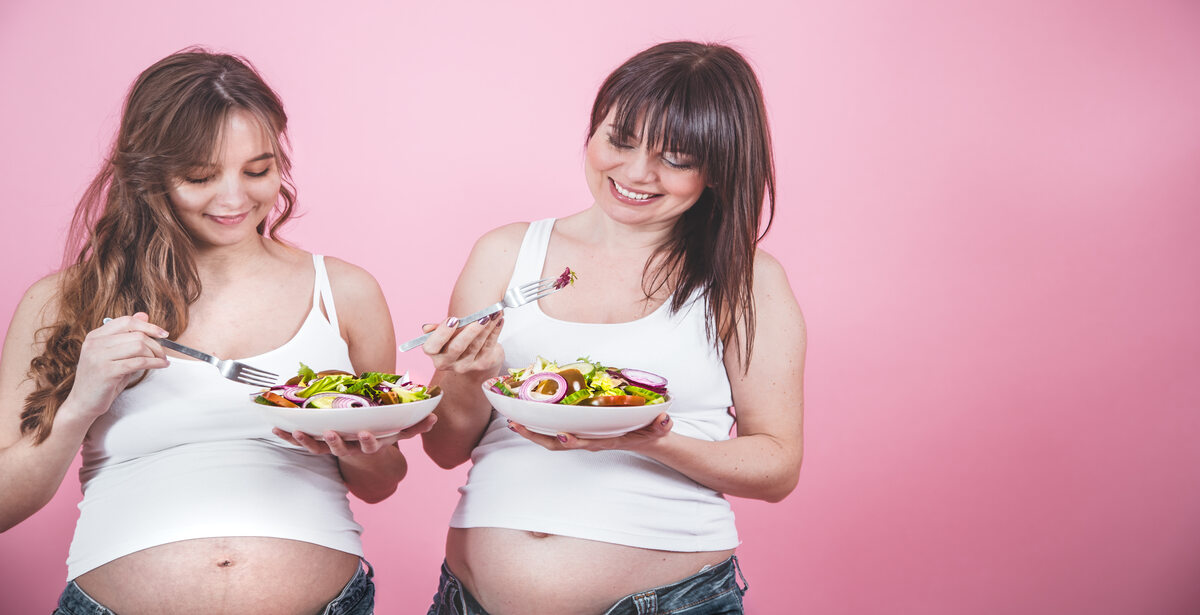While you’re pregnant, it’s common to hear the phrase, “You’re eating for two!” But it’s not just about eating more—it’s about eating better. Your body needs extra protein, vitamins, and minerals to support your growing baby. And this often brings up the big question: What foods to eat while pregnant?
First things first: Healthy eating is essential during pregnancy. It’s not only crucial for your baby’s growth and development but also for your own energy and well-being. However, not all healthy foods are equal during pregnancy. Some foods—like sushi, certain cheeses, and deli meats—are considered safe otherwise but aren’t preferable for a pregnancy diet due to risks of infection or contamination.
With that in mind, let’s read on the healthy foods for pregnancy to help you create a balanced and nourishing diet.
29 Healthy Foods For Pregnancy
Choose the ones that you love having from this list of best foods for pregnancy.
1. Lentils and Legumes
Lentils and legumes, such as chickpeas, kidney beans, and lentils, are rich in folate and fiber, making them essential for a healthy pregnancy. One cup of lentils provides almost 60 percent of the daily recommended serving of folate for pregnant and lactating women, which is crucial for the development of your baby’s neural tube.
Additionally, beans and lentils are among the best plant-based sources of protein, providing around 18 grams per cup. This means you can get a significant portion of your daily protein intake from these foods. Experts recommend at least 60 grams of protein per day during pregnancy, and lentils and legumes can help you meet that requirement. You can add them to rice, toss them in a salad, or make a hearty stew for a nutritious and delicious meal.
2. Eggs
Many pregnant women avoid eating meat or fish during pregnancy, which makes eggs an excellent option among foods to eat while pregnant. It is the best alternative to provide the protein-rich diet necessary for both you and your baby’s muscle and tissue development.
Eggs also offer other essential nutrients. They are rich in choline, which supports brain development and reduces the risk of neural tube defects. Eggs are also packed with vitamins and minerals, including vitamin D, which aids in calcium absorption, essential for your baby’s bone development.
Eating one or two eggs a day can provide a healthy dose of these nutrients. A quick dinner option could be a vegetable omelet, or you can add eggs to salads, sandwiches, or even breakfast bowls.
3. Leafy Greens
Leafy greens like spinach, kale, and Swiss chard are some of the best foods to include in your pregnancy meal plan. For you, they increase your intake of essential nutrients such as vitamins A, C, and K, while iron helps prevent anemia during pregnancy.
For your baby, the folate present in spinach and other leafy greens plays a key role in fetal development, especially in the early stages. Folate supports the development of your baby’s neural tube, which later forms the brain and spinal cord.
4. Salmon
Salmon works wonders during pregnancy! This fish is rich in omega-3 fatty acids, which help support your pregnancy in various ways. Omega-3 fatty acids can reduce the risk of hypertension and promote healthy blood circulation, reducing the risk of complications during pregnancy.
Salmon is also great for your baby’s brain and eye development. You can aim for 2-3 servings (about 8-12 ounces) of low-mercury fish like salmon per week. Make sure to bake or grill it for a nutritious meal. It’s important to avoid raw fish to reduce the risk of food borne illnesses, so opt for fully-cooked salmon in dishes like baked salmon with herbs or grilled salmon served with steamed vegetables.
5. Greek Yogurt
“Yogurt, oh how it nourishes you!” Greek yogurt has calcium, protein, and probiotics that support digestion and maintain a healthy gut, making it a great addition to your list of foods to eat while pregnant. The calcium in Greek yogurt is vital for the development of your baby’s bones and teeth.
You can enjoy Greek yogurt as a snack or add it to smoothies, breakfast bowls, or desserts. Look for plain, unsweetened varieties to avoid excess sugar and get the most benefits from this pregnancy-friendly food.
6. Sweet Potatoes
Whether baked, roasted, or mashed, sweet potatoes are one of the best foods for pregnancy. Eating simply one sweet potato can help deliver:
- Vitamin A – Important for your baby’s vision and immune system development.
- Fiber – Eases constipation during pregnancy and improves digestion.
- Potassium – Supports healthy blood pressure levels and can reduce swelling.
7. Berries
Berries like strawberries, blueberries, and raspberries are among the best foods to eat while pregnant. Packed with vitamin C, they support your immune system and help with collagen formation for your baby’s skin, cartilage, and bones.
Plus, full of antioxidants, they protect your cells from stress, and the fiber helps with digestion, easing pregnancy-related constipation. Enjoy them as a snack, or add them to smoothies, yogurt, or oatmeal for a quick, nutritious boost.
8. Avocados
Avocados are one of the best pregnancy foods as they balance both your weight during pregnancy and provide essential nutrients your body needs.
Rich in healthy fats, they keep you full and satisfied, supporting steady energy levels and preventing overeating or unhealthy cravings.
Avocados are also a great source of folate, potassium, and healthy fats, all of which support your baby’s development, regulate blood pressure, and help reduce swelling.
9. Lean Meat (Chicken, Turkey, Lean Beef)
Iron is one of the most essential nutrients during pregnancy, as it helps prevent anemia and supports the increased blood volume needed to nourish your baby. Experts suggest that pregnant women need around 27 mg of iron daily.
Lean meat is one of the best sources of iron, providing heme iron, which is more easily absorbed by the body.
If you’re a vegetarian, you can still meet your iron needs by incorporating plant-based sources like lentils, spinach, tofu, quinoa,and pumpkin seeds into your diet.
10. Nuts
Nuts like almonds, walnuts, and cashews are rich in healthy fats, protein, and essential nutrients like vitamin E and magnesium. This makes them an excellent addition to best foods to eat while pregnant.
While many pregnant women worry about fat intake, it’s important to know that nuts contain unsaturated fats. These fats are heart-healthy and support both your baby’s brain development and your overall health during pregnancy.
11. Seeds (Chia, Flaxseeds, Pumpkin Seeds)
During pregnancy, your body undergoes numerous changes, including increased strain on muscles and tissues. Seeds like chia, flaxseeds, and pumpkin seeds, being rich in omega-3 fatty acids and plant-based protein, are great foods to support muscle repair and overall recovery.
They also contain high fiber content, magnesium, calcium, and potassium, which
- Supports digestion
- Maintains healthy muscle function, and
- Promotes overall well-being for both you and your baby
These nutrients also play a crucial role in reducing inflammation and balancing hormones during pregnancy.
12. Dates
Dates are a healthy addition, packed with essential nutrients like fiber, iron, calcium, potassium, and magnesium. These nutrients support your overall health, boost energy, and help prevent iron deficiency. Dates are also beneficial for your baby’s bone development.
Thanks to their high fiber content, dates can help with digestion and ease constipation, which is common during pregnancy. These are all great reasons to count them as one of the best foods to eat while pregnant.
However, eating too many dates may lead to bloating or constipation, so it’s best to enjoy them in moderation. Soaking a few dates overnight and eating them in the morning is a great way to incorporate them into your diet.
13. Oranges
Hydration is crucial during pregnancy, and if you find yourself getting tired of drinking water, oranges are a great way to meet your hydration needs. One medium-sized orange contains about 85% water, making it an excellent source of hydration.
In addition to helping keep you hydrated, oranges are rich in vitamin C, which boosts your immune system and helps with the absorption of iron, reducing the risk of anemia. They also provide fiber to support healthy digestion.
Enjoy them fresh, juiced, or in a salad to give your pregnancy diet a refreshing boost!
14. Whole Grains
This one among the best foods to eat while pregnant are packed with B vitamins, iron, magnesium, and antioxidants. Examples include oats, quinoa, brown rice, whole wheat bread, and barley.
These nutrient-dense grains support your energy levels, aid digestion, and provide essential nutrients for both you and your baby.
They’re easy to include in meals. You can make a hearty quinoa salad for lunch, enjoy oats for breakfast or simply add barley to soups.
15. Cheese (Low-fat or Reduced-sodium options)
Is cheese a good food to eat while pregnant? Cheese is one of the most satisfying and nutritious foods for moms-to-be. It’s an excellent source of calcium, protein, and essential vitamins like vitamin D, which are crucial for your baby’s bone development and your own bone health.
Opting for low-fat or reduced-sodium options helps you avoid unnecessary fats and salt while still benefiting from the nutritional value of cheese.
You can enjoy cheese in many ways: add it to sandwiches, sprinkle it on salads, or melt it into a warm, comforting dish. Just remember to have in moderation, as too much cheese can lead to excess calorie or sodium intake.
16. Tomatoes
Yes! This universal food that’s enjoyed in salads, soups, sauces, and almost every cuisine is also a healthy food for pregnancy. Tomatoes offer a wealth of nutrients like vitamin C, potassium, and folate.
There are more benefits that make tomatoes one of the best foods for pregnancy:
- Rich in lycopene: A powerful antioxidant that helps fight inflammation and supports heart health.
- High in vitamin C: Boosts your immune system and aids in iron absorption, preventing anemia.
- Potassium: Helps maintain healthy blood pressure and reduces swelling.
- Folate: Essential for fetal development, especially in the early stages of pregnancy.
Enjoy tomatoes fresh in salads, as a topping on whole-grain toast, or blended into a delicious sauce for pasta or vegetables.
17. Broccoli
Broccoli is a superfood packed with essential vitamins, minerals, and fiber. One of the best things about broccoli is its high folate content, which is crucial for fetal development, especially in preventing neural tube defects.
Additionally, broccoli is rich in vitamin C, calcium, fiber, and antioxidants, which help boost immunity, support bone health, aid digestion, and protect against oxidative stress.
Including broccoli in your pregnancy meals can be as simple as adding it to salads, steaming it as a side dish, or mixing it into soups and stir-fries.
18. Soy Foods
Soy-based foods, such as tofu, edamame, soy milk, and tempeh, are an excellent addition to your pregnancy diet. They are rich in protein, iron, and essential amino acids, making them a great alternative for vegetarians and vegans.
Benefits of soy foods during pregnancy:
- Calcium and Magnesium: Many soy products are fortified with calcium, supporting bone health for both you and your baby.
- Protein: Soy provides a plant-based protein that supports your baby’s growth and muscle development.
- Iron: Soy is a good source of non-heme iron, which is important for preventing anemia and supporting your increased blood volume during pregnancy.
- Isoflavones: Soy contains isoflavones, which are phytoestrogens that may help with managing hormonal fluctuations, though it’s recommended to consume soy in moderation.
When choosing soy products, aim for organic and non-GMO options when possible. Also, keep in mind that moderation is key, as excessive soy consumption might have an impact on estrogen levels.
19. Papaya (Ripe, in moderation)
You might have heard that papaya is not recommended during pregnancy, but the key lies in what type of papaya you choose. Unripe or semi-ripe papayas contain latex, which can trigger uterine contractions and pose a risk during pregnancy.
However, ripe papaya is safe to eat in moderation. Generally, a small serving, such as a few slices or half a cup, a few times a week, is considered safe and beneficial. If you’re unsure, always consult your doctor before adding it to your pregnancy diet.
Eating ripe papaya during pregnancy benefits in several ways. It supports your immune system with its high vitamin C content, promotes healthy fetal growth with folate, and aids digestion.
About ways to include it in your pregnancy meals –
- Enjoy fresh ripe papaya as a snack or in smoothies.
- Add it to fruit salads or mix with yogurt for a refreshing treat.
- You can also blend it into a juice or use it in fruit salsas.
20. Apples
One of the preferred foods to eat while pregnant, offering a range of health benefits!
Rich in fiber, they help promote healthy digestion and prevent constipation, a common issue during pregnancy. Apples are also packed with vitamin C, which supports a healthy immune system and helps with the absorption of iron. The antioxidants in apples also help protect both you and your baby from oxidative stress.
You can enjoy apples as a quick snack, in smoothies, or sliced in salads for a nutritious and refreshing treat. Just be sure to wash them thoroughly before eating.
21. Cucumbers
The healthiest, low-calorie pregnancy food for your meals!
High water content in cucumbers makes them refreshing and helps keep you hydrated. Plus, they boast numerous health benefits like aiding digestion, reducing swelling, and providing essential vitamins like vitamin K and potassium.
Enjoy cucumbers as salads, eat them raw with a sprinkle of salt, or add them to smoothies for a hydrating boost!
22. Garlic
Although often considered a “heaty” food in traditional beliefs, garlic offers numerous benefits for pregnant women when consumed in moderation. Packed with antioxidants and essential compounds, garlic can help support your immune system, improve blood circulation, and even lower the risk of pregnancy-related hypertension.
However, overconsumption might cause heartburn or discomfort, so it’s best to enjoy garlic in small amounts, such as in soups, stir-fries, or seasoning for your meals.
23. Mangoes
This seasonal delight is a must-have if your pregnancy coincides with mango season! Mangoes are not only delicious but also has important nutrients that benefit you and your baby.
Rich in vitamin C, they help boost immunity, support collagen production, and improve iron absorption. Mangoes are also an excellent source of vitamin A, crucial for your baby’s vision and overall development. Additionally, their natural sweetness can satisfy cravings in a healthy way.
Have them fresh, as a smoothie, or mixed into a salad for a refreshing treat. Just be mindful of portions to avoid excess sugar intake!
24. Coconut Water
Coconut water is a refreshing drink and a great choice during pregnancy. It’s rich in electrolytes like potassium and magnesium, helping to keep you hydrated and energized. If you’re dealing with nausea or fatigue, it can be a soothing way to stay hydrated.
Low in calories and easy to digest, it also supports healthy digestion and may help regulate blood pressure. Fresh coconut water is always the best option!
25. Pomegranate
Pomegranate is a powerhouse fruit that’s perfect to be listed among the best foods to eat while pregnant. Packed with antioxidants, vitamin C, and potassium, it supports your immune system, boosts energy, and helps maintain healthy blood pressure. Its high iron content can also help prevent anemia during pregnancy.
Whether you enjoy it as fresh seeds, juice, or in salads, pomegranate is a delicious and nutritious addition to your diet!
26. Carrots
Carrots are an excellent pregnancy food, rich in beta-carotene, which converts to vitamin A to support your baby’s eye and skin development. They also provide fiber for digestion and vitamin C to strengthen your immune system.
Enjoy them raw as a snack, blended into smoothies, or cooked in soups and stir-fries for a healthy boost during pregnancy.
27. Tahini
A creamy paste made from sesame seeds, tahini is a nutritious addition to your pregnancy diet. It’s rich in calcium, iron, magnesium, and healthy fats, which support bone strength, energy levels, and healthy blood production for both you and your baby.
Plus, its nutrients can aid in the proper development of milk glands, preparing your body for breastfeeding.
28. Mushrooms
Mushrooms are a nutritious choice during pregnancy, offering a good source of B vitamins, iron, and potassium. These essential nutrients help maintain energy, support healthy blood production, and regulate blood pressure.
High in antioxidants and fiber, mushrooms also aid digestion and boost immune health. Be sure to cook them well to maximize their benefits.
They’re versatile and can be added to salads, soups, or stir-fries for a healthy meal.
29. Peas
Peas—rich in vitamins, fiber, and protein—are one of the most loved food items by pregnant moms, offering a tasty and nutritious addition to any meal.
High in folate, peas help with fetal growth, while iron supports healthy blood levels. They also provide fiber, which aids digestion and prevents constipation. Enjoy them in soups, salads, or as a simple side dish to boost your nutrient intake.
These best foods for pregnancy will help ensure you get the vitamins, minerals, and nutrients needed for a healthy pregnancy and a healthy baby. Whether you’re dealing with gestational diabetes or simply trying to maintain a balanced diet, these are the must-have foods to eat while pregnant. Meals with these foods will keep both you and your baby strong, nourished, and healthy.




